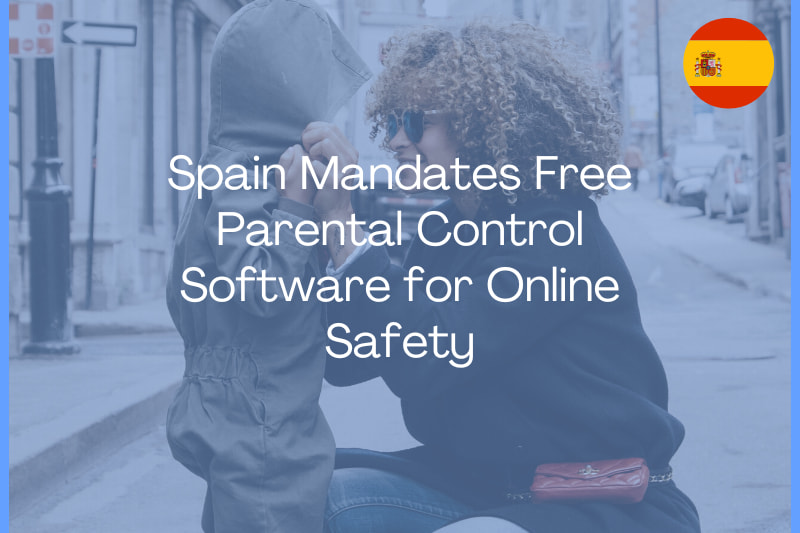Spain Mandates Free Parental Control Software for Online Safety
2025-08-14

On March 25, 2025, Spain’s Council of Ministers adopted a landmark measure requiring tech-companies to release Internet-connected devices with built-in parental control software. The law, part of the Organic Law on the Protection of Minors in Digital Environments, is designed to help parents filter harmful content, limit screen time, and monitor children's online activity. Children are among the most vulnerable groups to be exposed to cyberbullying, inappropriate content, and dangerous connections. Once enacted, Spain will take the leading position among the European frontrunners in legislating proactive online safety protections for young users. In this article, we make the decision to highlight the nature of this law.
Details of the Mandate
The new law relates to all Internet-connected devices sold in Spain, including smartphones, tablets, laptops, desktop computers, smart TVs, game consoles, and other smart devices. The mandatory term is that all these gadgets should have Internet access.
Companies must install parental control software before the device reaches retail outlets. The software must be activated by default when the device is first turned on. Internet service providers and telecom companies are also required to offer the software free of charge.
The parental control software must meet specific requirements:
- Block harmful or inappropriate websites and apps
- Allow parents to set daily screen-time limits
- Provide tools to monitor children's online activity
- Comply with Spain's data protection and privacy laws
The obligation covers both new devices and updated models released after the law comes into force. The Ministry of Digital Transformation will control law compliance. Companies that fail to meet the requirements may face penalties.
Required Built-In Features of the Parental Control Software
Does the law require mandatory features? Spain’s Council on Ministers demands to include the following built-in features of this tracking software:
- Effective, free, and accessible system: The law mandates that parental controls be both effective and easy to use, and provided for free.
- Activated by default on setup: Controls must be pre-installed and enabled immediately when consumers first set up their device.
- Content filtering tools: It should block harmful or inappropriate websites and apps, keeping kids away from risky online content.
- Screen time management: Parents must be able to set limits on daily screen time directly within the software.
These built-in features highlight Spain’s dedication to give children as much protection as possible. However, these features cannot 100% protect children online. Sometimes, parents should apply an integrated approach using built-in and third-party parental control software. One more component to be tracked online is social media monitoring such as Instagram, Snapchat, Telegram, WhatsApp, WeChat, Discord, etc.
Why Is It Mandatory to Introduce This Law?
The government in Spain claims the new law is mandatory to secure youngsters in the digital space. Officials highlight reviews confirming that children spend more time online than ever before. This increases the risk of exposure to harmful content, cyberbullying, and online predators.
The Ministry of Digital Transformation has stressed that parents need simple and effective tools to guide and protect their children's Internet use. By requiring built-in parental controls, the government aims to remove technical and cost barriers for families.
The law is also part of Spanish wider digital safety strategy. This strategy includes raising awareness about online risks, improving age verification, and increasing the age of digital consent. Officials believe these combined measures will help create a safer online environment for young users.
Public and Expert Reactions
The law has received strong support from many parents and child safety groups. They see it as a practical step to protect children from online threats. Advocacy organizations say free, built-in parental controls will help families who cannot afford commercial solutions.
Cybersecurity experts also welcome the measure but warn that technology alone is not enough. They stress the need for digital education and active parental involvement. Some experts raise concerns about the software's ability to keep up with new online risks.
Critics argue that mandatory controls could limit digital freedom. They worry about overblocking content or creating tools that could be misused for censorship. Privacy advocates also highlight the importance of strict safeguards for any data collected.
Industry representatives have mixed views. Some manufacturers say they already include similar features, while others warn that compliance may increase production costs. Telecom companies are preparing to integrate the required tools but request clear technical guidelines from the government.
Comparisons with Other Countries
| Country | Details |
|---|---|
| Spain |
Scope: All internet-connected devices Built-In by Default: Yes Free to Users: Yes Key Difference: Mandatory, activated by default |
| France |
Scope: All internet-connected devices Built-In by Default: Offered at setup Free to Users: Yes Key Difference: User chooses to activate |
| Italy |
Scope: ISP filtering tools Built-In by Default: Yes Free to Users: Yes Key Difference: Applies to ISPs, not manufacturers |
| Greece |
Scope: State-run parental app Built-In by Default: Yes Free to Users: Yes Key Difference: Government controls the app |
| Australia |
Scope: Social media ban under 16 Built-In by Default: N/A Free to Users: N/A Key Difference: Platform-level restriction |
Final Thoughts
Spain made a big deal when it mandated free parental control software for online safety. However, free tools, sometimes, cannot meet all the needs of the potential users. A balanced approach, combining built-in features with paid parental control tools, can offer more comprehensive protection for children’s online lives.
